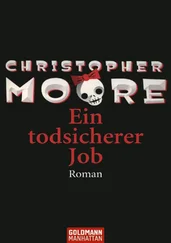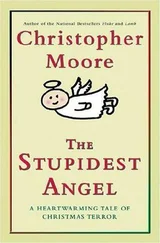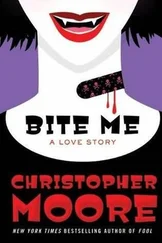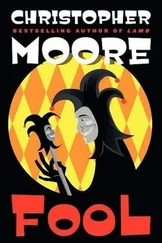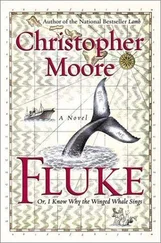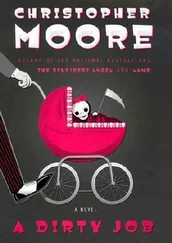He tucked the tags into the inside pocket of his trunks and dove again. He kicked down to the swath of cloth, holding his nose and blowing to equalize the pressure on his ears, even as the air in his lungs tried to pull him to the surface, away from his prize. It was some kind of printed cotton. He grasped at it and a piece came away in his hand. He pulled again, but the cloth was wedged into a crevice in the reef. He yanked and the cloth came away, revealing something white. Out of breath, he shot to the surface and examined the cloth. Flying piggies. Oh, good. He’d risked his life for Presbyterian dog tags and a flying piggies print.
One more dive and he saw what it was that had wedged into the crevice: a human pelvic bone. Whatever else had been here had been carried away, but this bone had wedged and been picked clean. Someone wearing flying piggies boxers had become part of the food chain.
The swim back to the channel seemed longer and slower, but this time Tuck forgot his fear of what might lurk behind the vasty blue. The real danger lay back on shore.
And how does one, over dinner, proffer the opinion that one’s employers are murdering organ thieves? “Stay on the sly,” Vincent had said. And so far he seemed to know what he was talking about.
“Oh, come in, Mr. Case. Sebastian is out on the lanai.” She wore a white raw silk pant suit, cut loose in the legs and low at the neck, a rope of pearls with matching earrings. Her hair was tied back with a white satin bow and she moved before him like the ghost of good housekeeping. “How do you feel about Pacific lobster?”
“I like it,” Tuck said, looking for some sign from her that she knew that he knew. There was no acknowledgment of her appearance in his room last night or that she had any suspicion of him at all. Tuck said, “I feel like I’m taking advantage coming to dinner empty-handed. I ought to have you and the doc over to my place some evening.”
“Oh, do you cook too, Mr. Case?”
“A few things. My specialty is blackened Pez.”
“A Cajun dish?”
“I learned to make it in Texas, actually.”
“A Tex-Mex specialty, then.”
“Well, a fifth of tequila does make it taste a little better.”
She laughed, a polite hostess laugh, and said, “Can I get you something to drink?”
“You mean a drink or some liquid?”
“I’m sorry. It does seem constraining, I’m sure, but you understand, you might have to fly.”
She had a large glass of white wine on the counter where she had been working. Tuck looked at it and said, “But performing major surgery under the influence is no problem, right?” That was subtle, Tuck thought. Very smooth. I am a dead man.
Her eyes narrowed, but the polite smile never left her lips. “Sebastian,” she called, “you’d better come in, dear. I think Mr. Case has something he wants to discuss with us.”
Sebastian Curtis came through the french doors looking tall and dignified, his gray hair brushed back, his tan face striking against the gray. To Tuck he looked like any number of executives one might see at a yacht club, a retired male model perhaps, a Shakespearean actor finally finished with the young prince and lover roles, seasoned and ready to play Caesar, Lear, or more appropriately, Prospero, the banished wizard of The Tempest .
Tuck, still in his borrowed clothes, baggy and rolled at the cuffs, felt like a beggar. He fought to hold on to his righteous indignation, which was an unfamiliar emotion to him anyway.
Sebastian Curtis said, “Mr. Case. Nice to see you. Beth and I were just talking about how pleased we are with your work. I’m sure these impromptu flights are difficult.”
“Mr. Case was just suggesting that we keep an eye on our alcohol consumption,” Beth Curtis said. “Just in case we might have to perform an emergency surgery.”
The jovial manner dropped from the doctor like a veil. “And just what kind of surgery might you be referring to?”
Tuck looked at the floor. He should have thought this through a little more. He fingered the dog tags in his pocket. The plan was to throw them on the table and demand an explanation. What had happened to the skel-eton, the owner of the tags? And for that matter, what would happen to Tucker Case if he threw this in their faces? Mary Jean used to say, “In ne-gotiations, always leave yourself a way out. You can always come back later.”
Go slow, Tuck told himself. He said, “Doc, I’m concerned about the flights. I should know what we’re carrying in case we’re detained by the authorities. What’s in the cooler?”
“But I told you, you’re carrying research samples.”
“What kind of samples?” It was time to play a card. “I’m not flying again until I know.”
Sebastian Curtis shot a glance at his wife, then looked back to Tucker. “Perhaps we should sit down and have a talk.” He pulled a chair out for Tucker. “Please.” Tuck sat. The doctor repeated the gesture for his wife and then sat down next to her, across the table from Tuck.
“I’ve been on Alualu for twenty-eight years, Mr. Case.”
“What does that have to do…?”
Curtis held up a hand. “Hear me out. If you want answers, you have to take them in the context that I give them.”
“Okay.”
“My family didn’t have the money for medical school, so I took a scholarship from the Methodist Missions, on the condition that I work for them when I graduated and go where they sent me. They sent me here. I was full of myself and full of the Spirit of the Lord. I was going to bring God and healing to the heathens of the Pacific. There hadn’t been a Christian missionary on the island since World War II, and I was warned that there might be a residual Catholic influence, but the Methodists have liberal ideas about spreading the Word of God. A Methodist missionary works with the culture he finds. But I didn’t find a Catholic population here. What I found was a population that worshipped the memory of an American pilot and his bomber.”
“A cargo cult,” Tuck said, hoping to move things along.
“Then you know about them. Yes, a cargo cult. The strongest I’d ever heard of. Fortunately for me, it wasn’t based on the hatred of whites like the cargo cults in New Guinea. They loved Americans and everything that came from America. They took my medicine, the tools I brought, food, reading material, everything I offered them, except, of course, the Word of God. And I was good to them. The natives on this island are the health-iest in the Pacific. Partly because they are so isolated that communicable diseases don’t reach them, but I take some credit for it as well.”
“So that’s why you don’t let them have any contact with the ship when it arrives?”
“No, well, that is one of the reasons, but mainly I wanted to keep them away from the ship’s store.”
“Why?”
“Because the store offered them things that I couldn’t or wouldn’t give them, and the store only accepted money. Money was becoming an icon in their religion. I heard drums in the village one night and went into the village to find all the women crouched around a fire holding wooden bowls with a few coins in the bottom. They were oiled and waving their heads as if in a trance, and as the drummers played, the men, wearing masks fashioned to look like the faces on American currency, moved around be-hind the women, copulating with them and chanting. It was a fertility ce-remony to make the money in the bowls multiply so they could buy things from the ship’s store.”
“Well, it does sound better than getting a job,” Tuck said.
Curtis didn’t see the humor. “By forbidding them to have contact with the ship, I thought I could kill the cargo cult, but it didn’t work. I would talk of Jesus, and the miracles that he performed, and how he would save them, and they would ask me if I had seen him. Because they had seen their savior. Their pilot had saved them from the Japanese. Jesus had just told them that they had to give up their customs and taboos. Christianity couldn’t compete. But I still tried. I gave them the best care I could. But after five years, the Methodist Missions sent a group of officials to check on my progress. They cut my funding and wanted to send me home, but I decided to stay and try to do the best I could without their support.”
Читать дальше


